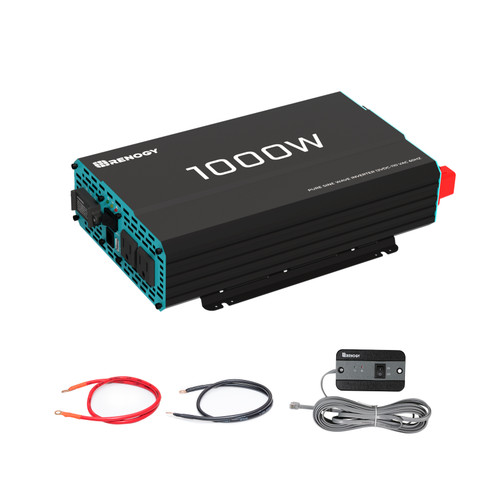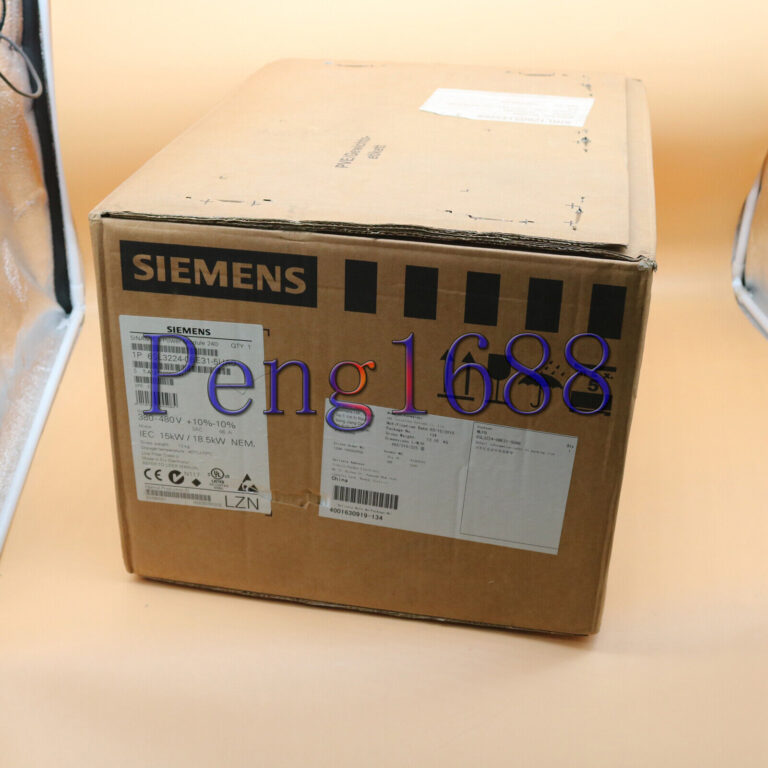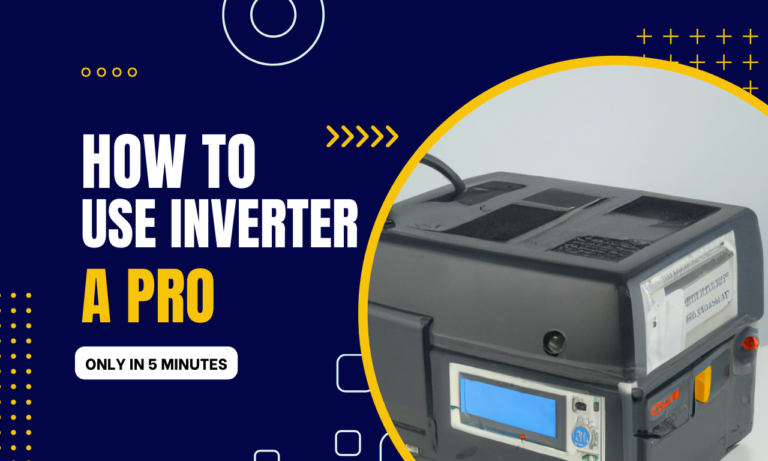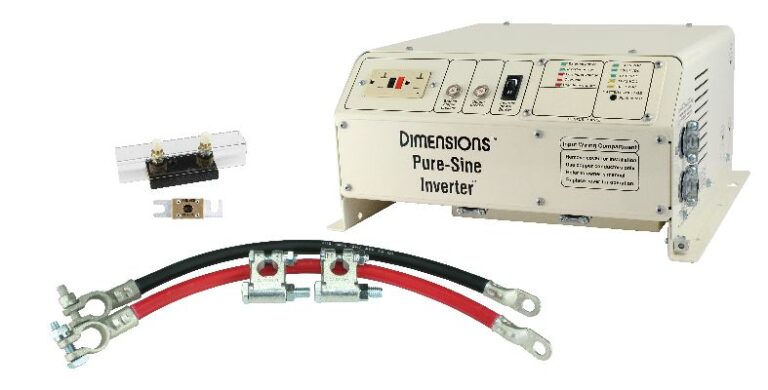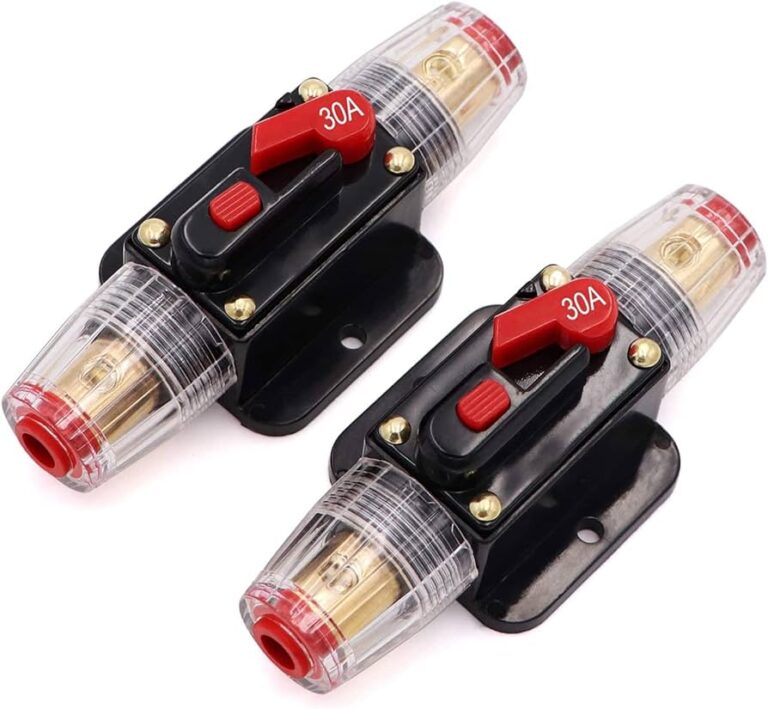How Long Will Battery Last With 1000W Inverter: Maximizing Your Power Usage
The battery life of a 1000W inverter will depend on several factors, including the capacity of the battery and the load being powered. However, with a brand new, fully charged 12V 100Ah lead-acid deep cycle battery and assuming an energy efficiency of 85%, you can expect a runtime of approximately 30-35 minutes.
When using a 1000W inverter, it is crucial to know how long your battery will last to ensure uninterrupted power supply. The battery’s capacity and the load being powered are the key factors in determining the battery life. We will explore the expected runtime of a 1000W inverter with a 12V 100Ah lead-acid deep cycle battery and an energy efficiency of 85%.
Understanding the battery’s capabilities will help you plan your power usage and make informed decisions when using a 1000W inverter.
Table of Contents
Factors Affecting Battery Life With 1000W Inverter
With a fully charged 12V 100Ah lead-acid deep cycle battery and an 85% energy efficiency, a 1000W inverter will last approximately 30-35 minutes.
When it comes to determining how long a battery will last with a 1000W inverter, several factors come into play. Let’s take a closer look at these factors to understand their impact on battery performance:
Power Consumption Of Devices:
- The power consumption of the devices that are connected to the inverter plays a crucial role in determining the battery life. Devices with higher power requirements will drain the battery faster. It’s important to consider the wattage of the devices you plan to run on the inverter.
Inverter Efficiency:
- The efficiency of the inverter affects battery life. Inverters convert DC power from the battery to AC power for your devices. The higher the efficiency, the less power will be wasted in the conversion process, resulting in improved battery performance.
Battery Capacity:
- The capacity of the battery is another vital factor affecting battery life. Batteries with larger capacities can store more energy, allowing them to power your devices for a longer duration. It is crucial to choose a battery with sufficient capacity to meet your power requirements.
Other Factors:
- Apart from these key factors, there are a few other aspects that can influence battery life with a 1000W inverter:
- Battery age: Older batteries tend to have reduced capacity and may not last as long as newer ones.
- Battery type: Different battery chemistries have varying discharge rates and efficiencies, affecting overall performance.
- Temperature: Extreme temperatures, both hot and cold, can impact battery performance and lifespan.
- Depth of discharge: Discharging the battery too much can shorten its lifespan.
Understanding these factors and making informed choices can help you optimize the battery life with a 1000W inverter. It is essential to consider the power consumption of your devices, the efficiency of the inverter, and the capacity of the battery to ensure efficient and prolonged operation.

Credit: www.amazon.com
Calculating Battery Life With A 1000W Inverter
With a 1000W inverter, the battery life will depend on factors such as the efficiency of the inverter and the capacity of the battery. On a fully charged 12V 100Ah battery, you can expect a runtime of approximately 30-35 minutes with an energy efficiency of 85%.
If you’re wondering how long your battery will last with a 1000W inverter, it’s important to consider various factors such as power consumption, inverter efficiency, and battery capacity. By following these steps, you can determine the approximate battery life you can expect with a 1000W inverter:
Step 1: Determine Power Consumption Of Devices
- Make a list of all the devices you plan to power with your 1000W inverter.
- Check the power rating (in watts) for each device. This information is usually indicated on the device or in the user manual.
Step 2: Calculate Power Usage In Amps
- Convert the power rating of each device from watts to amps by using the formula: Amps = watts / voltage.
- Most devices operate at 110-120 volts, so you can use this value for the voltage in the formula.
Step 3: Factor In Inverter Efficiency
- Inverters are not 100% efficient, which means some power is lost during the conversion process.
- Multiply the total power usage (in watts) calculated in Step 2 by the inverter efficiency (usually between 80-90%) to determine the actual power consumption.
Step 4: Determine Battery Capacity
- Check the capacity of your battery, which is usually measured in amp-hours (Ah).
- This information can be found on the battery itself or in its documentation.
Step 5: Calculate Battery Life With 1000W Inverter
- Divide the battery capacity (in amp-hours) by the actual power consumption (in amps) calculated in Step 3.
- The result will give you an estimate of how many hours your battery will last with a 1000W inverter.
Remember that these calculations provide an approximation, as real-world factors like battery age, temperature, and discharge rate can affect battery life. It’s always a good idea to have some extra capacity or a backup battery on hand to ensure uninterrupted power supply when using a 1000W inverter.
Now that you know how to calculate battery life with a 1000W inverter, you can plan your power usage accordingly and stay prepared for any situation.
Maximizing Battery Life With A 1000W Inverter
With a 1000W inverter, the battery life will depend on the capacity of the battery. For example, with a fully charged 12V 100Ah lead-acid deep cycle battery, you can expect a runtime of approximately 30-35 minutes.
If you’re using a 1000W inverter, it’s important to maximize your battery life to ensure prolonged power supply. By following these tips and guidelines, you can optimize the efficiency of your battery and extend its lifespan:
Choose Energy-Efficient Appliances:
- Select appliances and devices that are energy-efficient to minimize power consumption. Look for appliances with high energy star ratings or low wattage requirements.
- Opt for LED or CFL light bulbs instead of incandescent bulbs, as they consume less power and last longer.
- Consider newer models and technology that are designed to be more energy-efficient, such as smart appliances and low-power devices.
Optimize Power Consumption:
- Prioritize essential devices and minimize the use of non-essential ones to conserve battery power. Identify which appliances are crucial and allocate power accordingly.
- Unplug devices and chargers when they are not in use, as they can still draw power in standby mode.
- Use power-saving settings on your electronic devices, such as laptops and smartphones, to reduce their energy consumption.
Consider Renewable Energy Sources:
- Explore the use of renewable energy sources to supplement or replace your battery power. Solar panels, wind turbines, or hydroelectric systems can be used to generate clean energy and reduce reliance on battery power.
- If feasible, connect your 1000W inverter to a solar power system to harness the energy from the sun, which can significantly reduce your battery usage.
Remember, by choosing energy-efficient appliances, optimizing power consumption, and considering renewable energy sources, you can maximize your battery life with a 1000W inverter. These simple steps can help you prolong the runtime of your battery and ensure uninterrupted power supply for your needs.
Frequently Asked Questions On How Long Will Battery Last With 1000W Inverter
How Long Will A 1000W Inverter Run On An 100Ah Battery?
A 1000W inverter connected to a 100Ah battery can last approximately 30-35 minutes when fully charged. The battery voltage is 12V, and the inverter has an energy efficiency of 85%. The runtime may vary based on factors such as the battery’s condition, load capacity, and efficiency of the inverter.
It’s important to note that running the inverter at its maximum capacity will drain the battery faster. Additionally, using a deep cycle battery designed for powering inverters is recommended for optimal performance.
How Long Can You Run A 1000 Watt Inverter?
A 1000 watt inverter running at full capacity can run for approximately 2 hours with a 200 amp-hour battery. If the inverter is running at half capacity, it can last for 4 hours, and if it’s running at a quarter capacity, it can last for 8 hours.
To power a 1000 watt inverter, you will need either a 12V 100Ah battery or four 12V 100Ah lead-acid batteries connected in parallel. In one case, the inverter was able to run with a fridge for 17 hours.
What Size Battery Do I Need To Run A 1000W Inverter?
To run a 1000W inverter, you will need a 12V 100Ah battery or four 12V 100Ah lead-acid batteries in parallel. This setup will provide enough power to support the inverter’s operation. Additionally, we have calculated that with a fridge connected to the inverter, you can expect a runtime of approximately 17 hours.
Having the right size battery is crucial to ensure the proper functioning of your inverter and to maintain a consistent power supply. By using a battery with the appropriate voltage and capacity, you can enjoy uninterrupted power for your devices and appliances.
How Long Will An Inverter Run Off A 12V Battery?
A 1000W inverter running off a 12V battery can last approximately 30-35 minutes with a fully charged 100Ah lead-acid deep cycle battery. The runtime may vary depending on the energy efficiency of the inverter, which is typically around 85%. To provide a longer runtime, you may need to consider using a larger capacity battery or multiple batteries in parallel.
For example, for a 1000W inverter, you would need a 12V 100Ah battery or four 12V 100Ah lead-acid batteries. It’s important to note that running the inverter at full capacity will consume more battery power compared to running it at lower capacities.
Conclusion
The battery life of a 1000W inverter depends on various factors, including the capacity of the battery and the load being powered. If you have a fully charged 12V 100Ah lead-acid deep cycle battery and an energy-efficient 1000W inverter, you can expect a runtime of around 30-35 minutes.
However, it’s important to note that this runtime may vary based on the actual energy efficiency of your inverter and the specific power requirements of your devices. For longer runtimes, you may need to consider using multiple batteries. For example, using four 12V 100Ah lead-acid batteries in parallel can potentially extend the runtime of a 1000W inverter.
Understanding the relationship between your inverter, battery capacity, and power requirements is crucial for determining how long your battery will last. By properly sizing your battery and considering energy efficiency, you can ensure reliable power supply for your devices when using a 1000W inverter.

